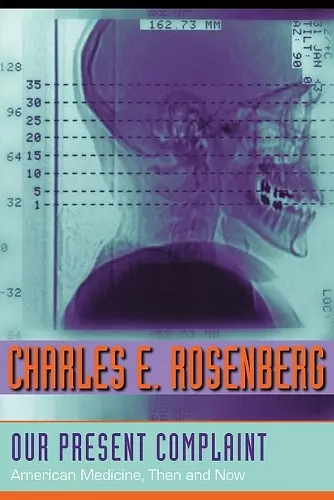Our Present Complaint
American Medicine, Then and Now
Format:Paperback
Publisher:Johns Hopkins University Press
Published:8th Jan '08
Currently unavailable, and unfortunately no date known when it will be back

Strikingly original. Rosenberg gains fresh insights by placing important, timely problems in a larger cultural and social context. A major contribution to the field of medical history. -- Alan Derickson, author of Health Security for All: Dreams of Universal Health Care in America Rosenberg brilliantly elucidates the continuing dialectic between biomedical reductionism and medicine as a caring, applied science. Beautifully nuanced and illuminating the complexities of science, marketplace, and social policy, Our Present Complaint reaffirms the essential social role of medicine as it responds to changes in science and technology, values and expectations, business endeavors, and ethical concerns. -- David Mechanic, Rene Dubos University Professor of Behavioral Science, Rutgers University With penetrating intelligence and insight, Charles Rosenberg examines in these thematically interwoven essays the tenacious social and moral ideas and values that underlie biomedicine; the variety of contexts in which they have been historically expressed in American society; and their vital relationship to the scientific, technological, and structural changes that medicine and the delivery of care have undergone during the past two centuries. -- Renee C. Fox, Annenberg Professor Emerita of the Social Sciences, University of Pennsylvania Exploring such topics as the history of diagnostic reasoning, the role of genetics, and the place of bioethics, Charles Rosenberg offers a historian's perspective on how society came to be in its current medical predicament. Deeply informed and informative, this work illustrates why Rosenberg is rightly regarded as the dean of American medical historians. -- Harvey V. Fineberg, President, Institute of Medicine
At a time when clinical care and biomedical research generate as much angst as they offer cures, this volume provides valuable insight into how the practice of medicine has evolved, where it is going, and how lessons from history can improve its prognosis.Charles E. Rosenberg, one of the world's most influential historians of medicine, presents a fascinating analysis of the current tensions in American medicine. Situating these tensions within their historical and social contexts, Rosenberg investigates the fundamental characteristics of medicine: how we think about disease, how the medical profession thinks about itself and its moral and intellectual responsibilities, and what prospective patients-all of us-expect from medicine and the medical profession. He explores the nature and definition of disease and how ideas of disease causation reflect social values and cultural negotiations. His analyses of alternative medicine and bioethics consider the historically specific ways in which we define and seek to control what is appropriately medical. At a time when clinical care and biomedical research generate as much angst as they offer cures, this volume provides valuable insight into how the practice of medicine has evolved, where it is going, and how lessons from history can improve its prognosis.
Cogently written and well documented, the book will benefit medical practitioners, and will be especially useful to those who make medical policy. Highly recommended. Choice 2008 This collection of essays, drawing on Rosenberg's half-century career as one of our preeminent historians of medicine, will be well appreciated by fellow historians and their students, but it ought to be required reading for health care providers, payers, policy makers, and patients. -- Elizabeth Siegel Watkins Journal of American History 2008 Our Present Complaint... is a timely book. It examines important concepts and history that people need to be aware of and think through if they seek to understand and address the many problems with the American medical system. -- Sharon A. Falkenheimer Themelios 2008 [Rosenberg] reminds us that the problems addressed by disciplines such as bioethics and interdisiplinary communities such as that of health policy are inevitably situated and configured by a broader context to which ethicists and policy makers would do well to pay attention. -- Thomas S. Huddle, M.D., Ph.D. Journal of the History of Medicine 2009
ISBN: 9780801887161
Dimensions: 229mm x 152mm x 15mm
Weight: 318g
224 pages